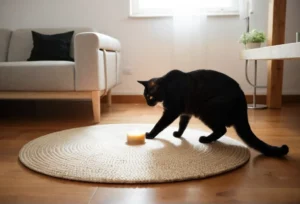Cats are known for their nocturnal behavior, often leaving their owners wondering why they are more awake at night. In this blog post, we will explore the reasons behind this common feline trait.
Natural Instincts
Cats have a long history of being nocturnal creatures, which can be traced back to their evolutionary roots. In the wild, cats’ ancestors hunted prey under the cover of darkness to avoid predators and increase their chances of a successful catch. This behavior has been passed down through generations, leading to modern-day domestic cats being more active at night.
Their nighttime activity is also influenced by their keen senses, particularly their exceptional night vision. Cats have eyes that are designed to see in low light conditions, allowing them to navigate and hunt effectively in the dark. This natural advantage makes nighttime the perfect time for cats to indulge in their playful and curious behaviors.
Hunting Behavior
A cat’s hunting instincts are a major driving force behind their nighttime antics. Even though our furry friends may not need to hunt for food anymore, their instinct to stalk, pounce, and chase prey remains strong. This behavior is not only a fun way for cats to stay mentally and physically stimulated, but it also satisfies their natural urge to hunt.
To cater to your cat’s hunting instincts, consider providing interactive toys that mimic prey movements. Toys like feather wands or laser pointers can engage your cat’s hunting instincts and provide a healthy outlet for their nighttime energy. Remember, a tired cat is a happy cat!
Unique Insight: Cats’ hunting behavior at night can also be attributed to their crepuscular nature, which means they are most active during dawn and dusk. This natural behavior reflects their wild ancestors’ hunting patterns when prey is most abundant. So don’t be surprised if your feline friend becomes a nighttime ninja when the sun goes down!
Sensory Perception
Cats have heightened senses, making them more active at night. Their exceptional hearing allows them to detect even the slightest movements in the dark. Their night vision is superior to humans, enabling them to navigate and hunt effectively in low light conditions. Additionally, their sense of smell is highly developed, aiding them in locating prey or potential threats during nighttime hours. These acute senses make the night a prime time for cats to explore and engage in their natural behaviors.
Circadian Rhythms
A cat’s internal clock operates differently from humans. Cats are classified as crepuscular, meaning they are most active during dawn and dusk. This evolutionary trait stems from their ancestors’ hunting patterns, as these twilight hours offer ideal lighting for hunting. As a result, cats are naturally wired to be more alert and active at night. While domestication has somewhat altered this behavior, many cats still exhibit a preference for nighttime activities. Understanding these unique circadian rhythms can help owners better accommodate their feline companions’ nighttime tendencies.
Additional Insight:
To help encourage a more diurnal schedule for your cat, try engaging in playtime and feeding sessions during the daytime. This can help shift their activity peak to align more with your own schedule.
Lack of Distractions
At night, when the world is quiet and still, cats often find themselves in their element. The lack of distractions allows them to embrace their inner hunters and engage in activities like playing, exploring, and hunting that might go unnoticed during the busy daytime hours. The serene atmosphere of the night triggers their nocturnal instincts, making them more active and alert. So, if you find your feline friend running around in the wee hours, remember they’re just responding to their natural urges in a peaceful environment.
Domestication Influences
Throughout history, cats have evolved alongside humans, adapting to our habits and lifestyle. Domestic cats have inherited behaviors from their wild ancestors, who were more active during the night to avoid larger predators. This instinct has been passed down through generations, leading pets to display similar patterns. Cats may also be influenced by their owners’ schedules, as they learn to adjust their activity levels to match the household rhythm. This interplay of natural instinct and domestication explains why your furry companion may be wide awake when you’re ready to hit the sack.
- Moreover, the feeding patterns of domestic cats contribute to their nighttime activity. In the wild, cats are nocturnal hunters and prefer to hunt during the night. By imitating this behavior, house cats may exhibit increased activity levels after dark. To help regulate their nighttime behavior, consider feeding your cat a larger meal before bedtime to encourage rest and relaxation during the night.
Ways to Encourage Daytime Activity
If your cat is keeping you up at night with their nocturnal antics, there are ways to help shift their activity to daytime. One effective strategy is to provide interactive toys that stimulate their natural hunting instincts during daylight hours. Puzzle feeders, feather wands, and laser pointers can all offer mental and physical enrichment to keep them engaged while the sun is up.
Another helpful tactic is to establish a routine that includes consistent playtime sessions during the day. Cats thrive on structure and predictability, so setting aside designated play intervals can help them expend energy and avoid restlessness at night. Consider investing in a variety of toys to keep things interesting and prevent boredom.
Creating a comfortable and inviting nap area near a sunny window can also encourage your cat to be more active during daylight hours. Natural light exposure throughout the day can help regulate their internal clock and promote healthier sleep patterns. Additionally, incorporating scratching posts and climbing trees into their environment can provide opportunities for exercise and mental stimulation.
Remember, patience and consistency are key when trying to shift your cat’s activity to daytime. It may take time for them to adjust to a new routine, so stay committed to providing engaging activities and opportunities for play during the day.
Additional Insight : Introducing a variety of textures and surfaces in your cat’s play area can enhance their sensory experience and keep them engaged for longer periods of time. Consider rotating toys and changing up their play environment to prevent boredom and promote exploration.
Nighttime Playtime Ideas
When it comes to preventing disruptive nighttime behavior in your cat, engaging them in stimulating activities during the evening can make a big difference. Interactive play sessions before bedtime can help burn off excess energy and encourage a more relaxed state for sleeping.
One fun idea is to create a scavenger hunt for your cat using treats or toys hidden around the house. This can mimic their natural hunting instincts and provide mental stimulation that can tire them out before bedtime. Puzzle toys that dispense treats can also keep them occupied and mentally engaged during the night.
Setting up a cozy and inviting play area in a quiet part of your home can encourage your cat to engage in nighttime play without disturbing your sleep. Consider placing boxes, tunnels, and climbing structures in this space to create a mini adventure zone for them to explore.
Incorporating regular play sessions into your evening routine can help establish a sense of predictability for your cat and signal to them that nighttime is for winding down. Remember to keep playtime positive and rewarding to reinforce good behavior and strengthen your bond with your feline companion.
Nighttime Playtime Ideas: 1. Use interactive toys like feather wands and laser pointers for engaging play. 2. Create a scavenger hunt with treats or toys to stimulate their hunting instincts. 3. Provide puzzle toys that dispense treats to keep them mentally active. 4. Set up a cozy play area with boxes, tunnels, and climbing structures for exploration. 5. Establish a regular evening playtime routine to signal bedtime approaching.
Fun Facts About Cats’ Night Vision
Did you know that cats have an incredible ability to see in the dark? Their eyes have a special layer of cells called the tapetum lucidum, which reflects light and enhances their vision in low-light conditions. This not only allows them to navigate their surroundings at night but also gives them an advantage when hunting prey. So, the next time you see your cat effortlessly roaming around in the dark, remember that their impressive night vision is at play!
Mythbusting Common Misconceptions
Contrary to popular belief, cats are not necessarily more active at night because they are nocturnal. In reality, cats are crepuscular, which means they are most active at dawn and dusk. This behavior is a result of their natural hunting instincts, as these times of the day offer the best opportunities for hunting. So, if your cat seems to be more awake at night, it’s not because they prefer it – it’s just in their DNA to be more active during these periods.
Here are a few misconceptions debunked: – Cats are nocturnal animals: False, cats are crepuscular, meaning they are most active at dawn and dusk. – Cats are simply being mischievous at night: Not really, their increased activity is linked to their natural hunting behavior. – Cats can see in complete darkness: While their night vision is impressive, they still need some light to see clearly.
Remember, understanding your cat’s natural behavior can help you better cater to their needs and provide a more enriched environment for your feline friend.
Alex, a passionate animal lover, has experience in training and understanding animal behavior. As a proud pet parent to two dogs and three cats, he founded AnimalReport.net to share insights from animal experts and expand his knowledge of the animal kingdom.




